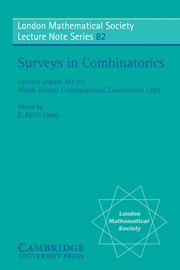Book contents
- Frontmatter
- Contents
- PREFACE
- GRAPHS AND INTERCONNECTION NETWORKS: DIAMETER AND VULNERABILITY
- THE FRIENDSHIP THEOREM AND THE LOVE PROBLEM
- MAXIMUM SETS IN FINITE PROJECTIVE SPACES
- QUASIGROUP IDENTITIES AND ORTHOGONAL ARRAYS
- BOUNDS ON PERMANENTS, AND THE NUMBER OF 1-FACTORS AND 1-FACTORIZATIONS OF BIPARTITE GRAPHS
- REDFIELD DISCOVERED AGAIN
- CHARACTERIZATIONS OF THE LIE INCIDENCE GEOMETRIES
- GL(n, C) FOR COMBINATORIALISTS
- IRREGULARITIES OF PARTITIONS: RAMSEY THEORY, UNIFORM DISTRIBUTION
- INDEX OF NAMES
- SUBJECT INDEX
IRREGULARITIES OF PARTITIONS: RAMSEY THEORY, UNIFORM DISTRIBUTION
Published online by Cambridge University Press: 05 May 2013
- Frontmatter
- Contents
- PREFACE
- GRAPHS AND INTERCONNECTION NETWORKS: DIAMETER AND VULNERABILITY
- THE FRIENDSHIP THEOREM AND THE LOVE PROBLEM
- MAXIMUM SETS IN FINITE PROJECTIVE SPACES
- QUASIGROUP IDENTITIES AND ORTHOGONAL ARRAYS
- BOUNDS ON PERMANENTS, AND THE NUMBER OF 1-FACTORS AND 1-FACTORIZATIONS OF BIPARTITE GRAPHS
- REDFIELD DISCOVERED AGAIN
- CHARACTERIZATIONS OF THE LIE INCIDENCE GEOMETRIES
- GL(n, C) FOR COMBINATORIALISTS
- IRREGULARITIES OF PARTITIONS: RAMSEY THEORY, UNIFORM DISTRIBUTION
- INDEX OF NAMES
- SUBJECT INDEX
Summary
Abstract. In this survey we discuss a common feature of some classical and recent results in number theory, graph theory, etc. We try to point out the fascinating relationship between the theory of uniformly distributed sequences and Ramsey theory by formulating the main results in both fields as statements about certain irregularities of partitions. Our approach leads to some new problems as well.
INTRODUCTION
In 1916 Hermann Weyl published his classical paper entitled “Ober die Gleichverteilung von Zahlen mod Eins”. This was intended to furnish a deeper understanding of the results in diophantine approximation and to generalize some basic results in this field. The theory of uniformly distributed sequences has originated with this paper. In the last decades this subject has developed into an elaborate theory related to number theory, geometry, probability theory, ergodic theory, etc.
Curiously enough, Issai Schur's paper entitled “Ober die Kongruenz xn+yn≡zn (mod p)” appeared in the very same year. He proved that if the positive integers are finitely colored, then there exist x, y, z having the same color so that x+y=z. Though Ramsey theory has various germs, Schur's theorem can be regarded as the first Ramsey-type theorem. Now literally the same applies to Ramsey theory as to the theory of uniform distribution:
In the last decades Ramsey theory became an elaborate theory related to number theory, geometry, probability theory, ergodic theory, etc.
- Type
- Chapter
- Information
- Surveys in CombinatoricsInvited Papers for the Ninth British Combinatorial Conference 1983, pp. 201 - 246Publisher: Cambridge University PressPrint publication year: 1983
- 4
- Cited by

